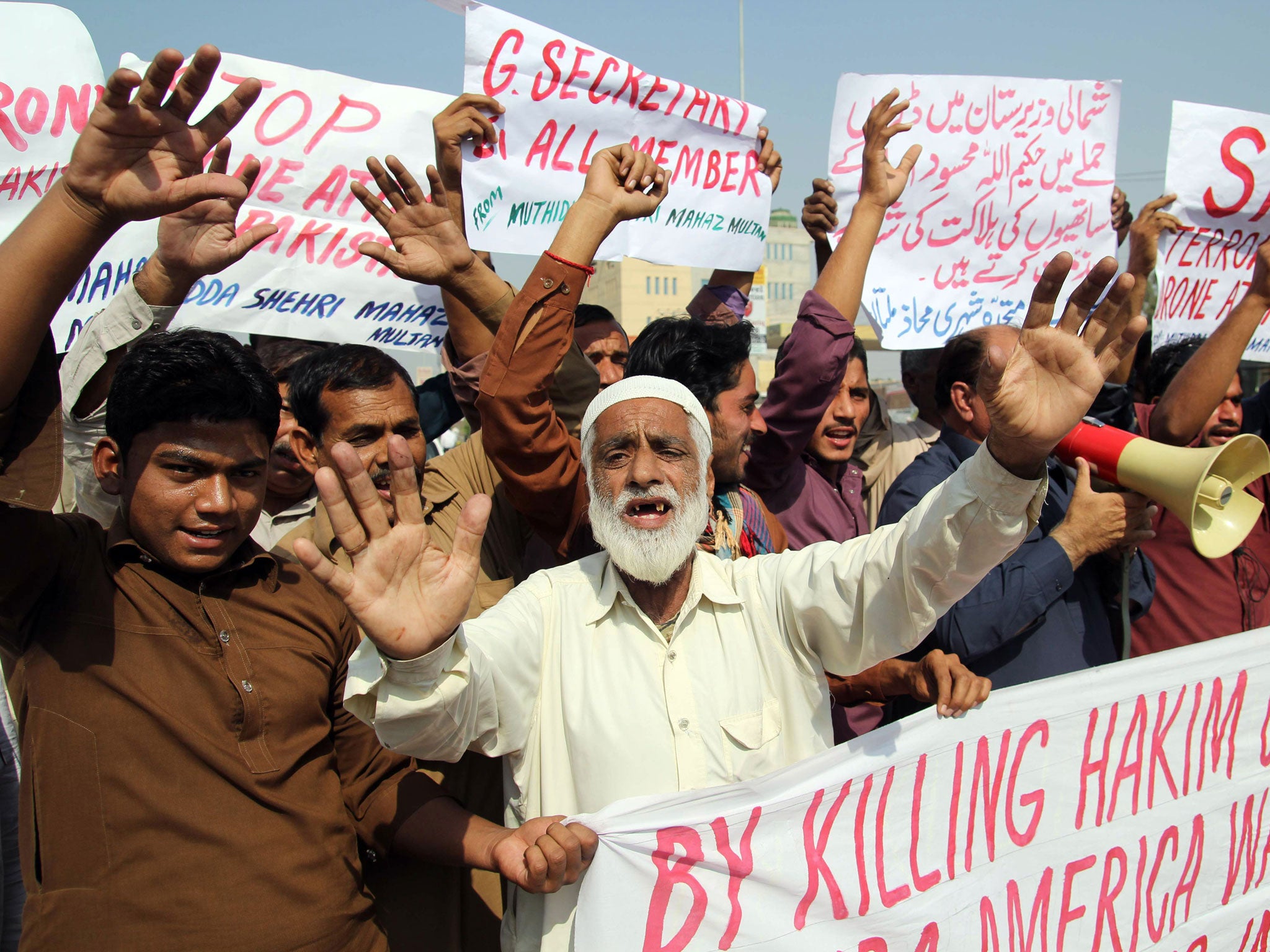Pakistan furious with US after killer drone strike
Government claims attack was attempt to derail peace talks

Pakistan said today it was looking to review its relationship with the US after furiously denouncing a drone attack that killed the leader of the Pakistani Taliban.
The strike that killed Hakimullah Mehsud on Friday has been described by government officials as a “deliberate” attempt to derail proposed peace talks with the militant group, a move they say could spark a wave of revenge bombings.
Prime Minister Nawaz Sharif’s office issued a statement yesterday saying he would chair a meeting about the consequences of the strike for Pakistan’s ties with Washington. It is unclear when this meeting will take place. Mehsud was a notably vicious leader of the Pakistani Taliban, a position to which he rose after his mentor, Baitullah Mehsud, was slain in an earlier drone strike in August 2009.
His death has dealt a severe blow to the Taliban, which has launched a wave of brutal attacks against Pakistani civilians as well as Pakistani and Nato soldiers on both sides of the border. The Pakistani Taliban, which has managed to sustain its campaign of violence despite numerous assassinations, is reportedly appointing a successor to Mehsud. It has also vowed to withdraw from any talks and unleash revenge bombings. The government’s reconsideration of ties with Washington comes on the heels of threats from the cricketer- turned-politician Imran Khan to choke off Nato’s supply route that runs through Khyber Pakhtunkhwa, the north-western province run by his Movement for Justice party.
“Now it has been proven,” Mr Khan said. “Whenever Pakistan has tried to move towards negotiations, drone attacks have sabotaged the move.”
Mr Khan accused the US of calculatedly undermining talks with the Taliban as part of a clandestine attempt to keep Pakistan “constantly at war”. No negotiations have begun, but a day before the strike that killed Mehsud, the government had announced the process was poised to begin. The BBC said a Pakistani delegation had been due to fly to the tribal area of North Waziristan on Saturday to meet Mehsud.
The public fury at drone strikes, even ones that kill Pakistan’s enemies, is reflective of the heightened pitch of anti-American fury inside the country. Urged on by the opposition, Mr Sharif complained about drone strikes on a visit to Washington to meet President Obama last week. There is a widespread perception within Pakistan, supported partly by a recent Amnesty International report, that unmanned American aircraft kill far more civilians than the CIA concedes. Recent independent estimates suggest that between 400 and 900 civilians have been killed in US drone strikes since 2008. However, a recent disclosure by Pakistan’s Ministry of Defence claimed that 67 civilians had been killed in such attacks in recent years, far less than its previous estimates.
The CIA’s drone aircraft target militants skulking in Pakistan’s tribal areas along the Afghan border. The murky information about drones and their targets reflects the difficulty in establishing exactly what happens in an area too dangerous for independent observers to explore. But the anger against drone strikes is not merely about civilian casualties. Over recent years, politicians such as Mr Khan have roused fierce opposition to the CIA programme by appealing to Pakistanis’ sense of nationalism and accusing the US of violating the country’s sovereignty.
The debate is also complicated by allegations of Pakistani connivance in the attacks. The former governments of presidents Asif Ali Zardari and Gen Pervez Musharraf both quietly co-operated with the US while publicly denouncing the strikes. Mr Sharif’s government says it wants drones to halt and for negotiations with the Taliban to pave the way for an end to the terrorist bombings.
But critics warn that talks will legitimise the militants and could lead to a capitulation to their demands.
Subscribe to Independent Premium to bookmark this article
Want to bookmark your favourite articles and stories to read or reference later? Start your Independent Premium subscription today.

Join our commenting forum
Join thought-provoking conversations, follow other Independent readers and see their replies